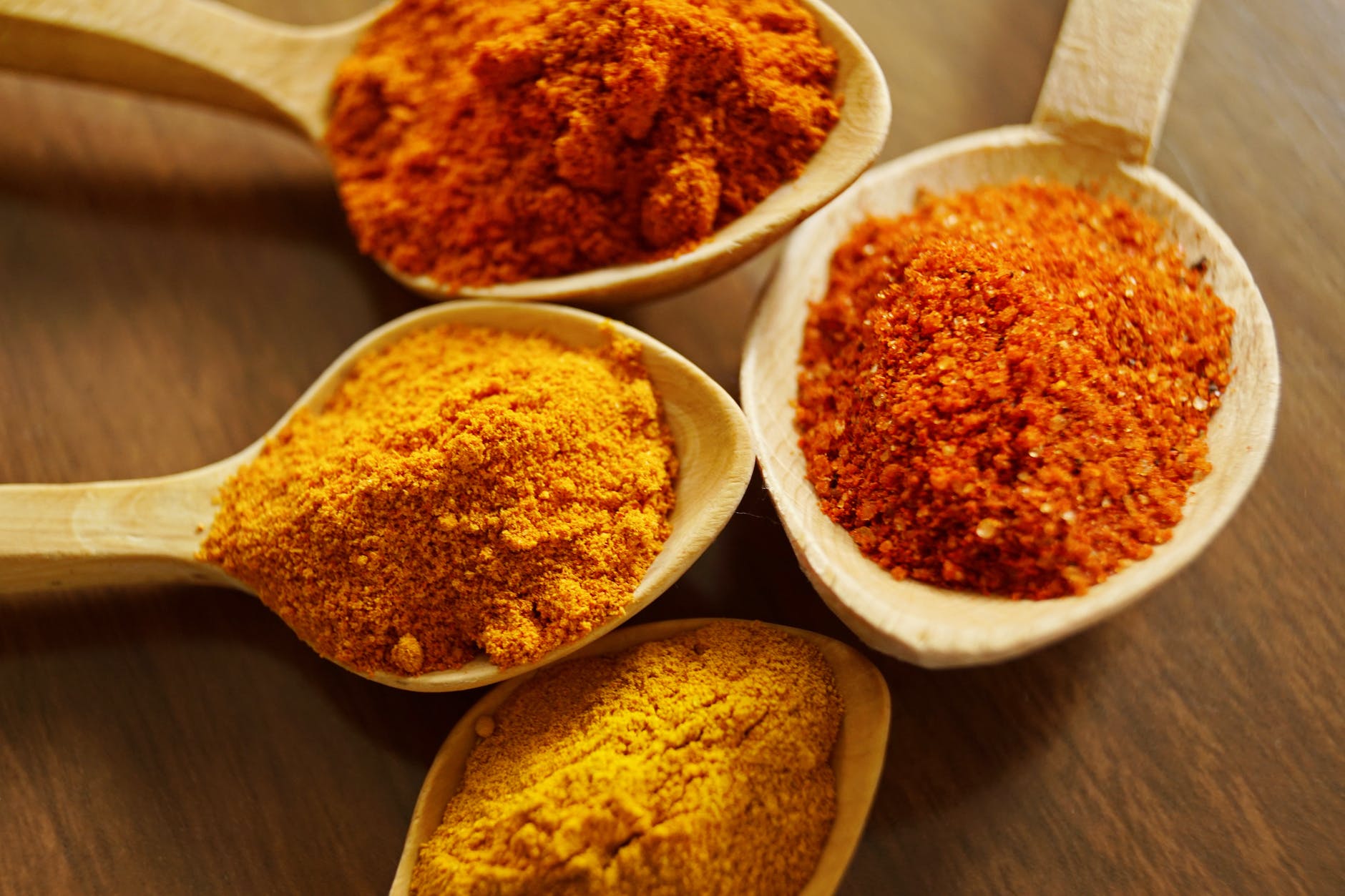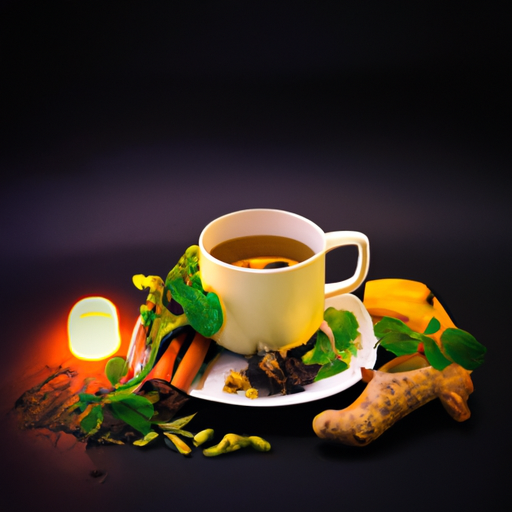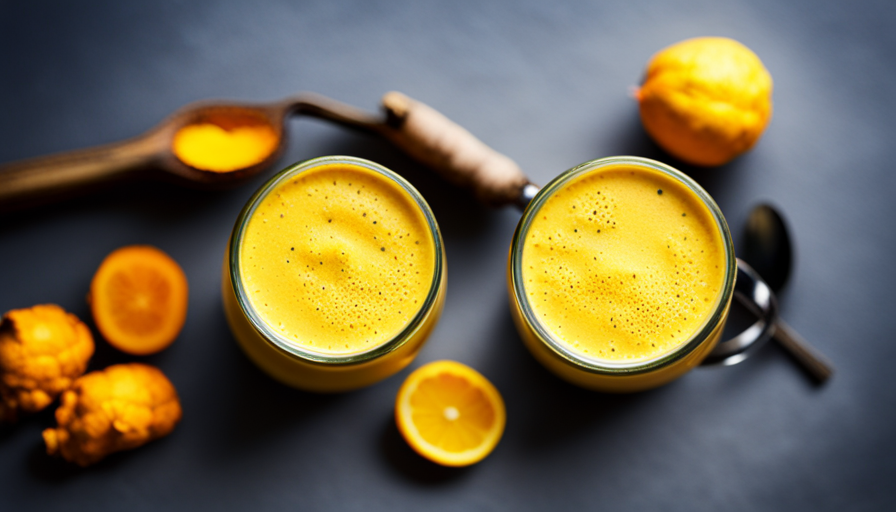As a person who is constantly seeking out beverages that are refreshing and good for you, I was excited to come across turmeric tea with milk. This delightful drink blends the comforting, earthy taste of turmeric with the creamy richness of milk to produce a beverage that is both soothing and beneficial.
One of the best things about this tea is its health benefits. Turmeric has long been celebrated for its anti-inflammatory properties, making it an ideal choice for anyone looking to boost their immune system or reduce inflammation in their body. And when combined with milk, which contains essential nutrients like calcium and vitamin D, this tea becomes an even more potent source of nutrition.

In this article, I will share my favorite recipe for making turmeric tea with milk and offer some tips on how to make sure your cup turns out perfectly every time.
Key Takeaways
- Turmeric tea has numerous health benefits, including anti-inflammatory and antioxidant properties, improved brain function, and boosted immunity.
- The recipe requires turmeric powder or fresh root, milk (dairy or non-dairy), water, and any additional spices or sweeteners. Black pepper can enhance the absorption of curcumin.
- Different variations can be made by adding ginger, cinnamon, cardamom, cloves, honey, lemon juice, or coconut milk. The ratio of ingredients can also be adjusted to personal taste preferences.
- Choosing high-quality ingredients, proper storage and reheating techniques, and using freshly grated turmeric root can ensure maximum flavor and health benefits. Turmeric tea can be enjoyed hot or cold, and incorporated into daily routine for optimal results.
The Health Benefits of Turmeric Tea With Milk
If you’re looking for a delicious way to boost your health, try sipping on some turmeric tea with milk – it’s loaded with amazing benefits! Turmeric is known for its anti-inflammatory and antioxidant properties, which can help reduce inflammation and fight off free radicals in the body. Additionally, curcumin – the active ingredient in turmeric – has been shown to have potential benefits for brain function, heart health, and even cancer prevention.
To make this powerful brew at home, all you need is some turmeric powder or fresh root, milk (dairy or non-dairy), water, and any additional spices or sweeteners you prefer. Simply heat up the water and milk in a saucepan until warm but not boiling, then add in the turmeric powder or grated root along with any other desired ingredients like cinnamon or honey. Let everything simmer together for a few minutes before straining into your mug of choice and enjoying!
Now that you know about some of the incredible turmeric tea benefits, let’s talk about what equipment you’ll need to get started making your own cup at home.
Equipment Needed to Make Turmeric Tea
You’ll need a few essential tools to prepare this delicious turmeric tea with milk. Don’t worry, you probably already have most of them in your kitchen. Here’s a quick rundown of what you’ll need:
| Essential Tools | Description |
|---|---|
| Small saucepan | Used for heating the milk and water mixture |
| Whisk or spoon | Used for stirring the ingredients together |
| Fine-mesh strainer | Used for straining out any clumps or pieces of ginger |
When it comes to making turmeric tea with milk, there are several different milk options available. You can use whole, low-fat, or non-dairy milks such as almond or coconut milk. Each option will give your tea a slightly different taste and texture, so feel free to experiment and find which one you prefer. One thing to keep in mind is that non-dairy milks tend to be thinner than dairy-based ones, so adjust accordingly if necessary.
Now that you know what tools and options are available for making turmeric tea with milk, let’s move on to the next section about the ingredients required.
Ingredients Required
To savor the taste of this golden drink, you’ll need a small saucepan, whisk or spoon, and fine-mesh strainer. You’ll also need your preferred milk option, ginger root, ground turmeric, honey or maple syrup, and black pepper. Turmeric tea benefits are numerous; it’s loaded with antioxidants and anti-inflammatory properties that help boost immunity and reduce inflammation in the body.
Black pepper enhances the absorption of curcumin (the active ingredient in turmeric) by up to 2000%, making it an essential component of this recipe. If you don’t have access to some ingredients mentioned above, don’t worry. There are plenty of alternative ingredients you can use. Instead of ginger root, try using ginger powder. Instead of honey or maple syrup, use stevia or agave nectar for sweetness. You can also choose between plant-based milk options like almond milk or coconut milk instead of cow’s milk.
With all these ingredients at hand, let’s move on to how to prepare turmeric tea with milk.
How to Prepare Turmeric Tea with Milk
Now that you’ve got all the necessary ingredients, let’s dive into creating a warm and cozy beverage that’ll not only satisfy your taste buds but also provide numerous health benefits.
Here’s how to make turmeric tea with milk:
-
Begin by heating one cup of milk in a saucepan until it comes to a simmer.
-
Add one teaspoon of ground turmeric, half a teaspoon of ground ginger, and half a teaspoon of cinnamon to the milk and stir well.
-
Let the mixture simmer for about 5 minutes, stirring occasionally.
Turmeric tea benefits are numerous, including its anti-inflammatory properties, which can help with arthritis pain and reducing inflammation in the body overall. If you prefer an alternative recipe, you could substitute almond milk or coconut milk for cow’s milk or add honey for sweetness.
To make sure your turmeric tea turns out perfectly every time, there are some tips you should keep in mind.
Tips for Making the Perfect Cup of Turmeric Tea
When it comes to making the perfect cup of turmeric tea, there are a few key points to keep in mind. First and foremost, choosing high-quality ingredients is crucial for achieving a delicious flavor and maximum health benefits.
Don’t be afraid to adjust the recipe to suit your personal taste preferences – whether that means adding more spice or sweetness.
And finally, proper storage and reheating techniques can ensure that your turmeric tea stays fresh and tasty for days to come.
Choosing the Right Ingredients
You’ll want to grab the freshest turmeric root and high-quality milk for a warm, comforting cup of turmeric tea that’ll have your taste buds thanking you.
When choosing quality turmeric, look for roots that are firm, unblemished, and brightly colored. Avoid any with mold or soft spots as they may be past their prime.
If you’re lactose intolerant or prefer a non-dairy option, there are plenty of milk alternatives available such as almond milk, coconut milk, or oat milk. Be sure to choose unsweetened varieties so as not to overpower the natural flavor of the turmeric.
With these simple ingredient choices in mind, you can create a delicious cup of turmeric tea that’ll nourish both your body and soul.
To adjust the recipe to suit your taste, experiment with different ratios of ingredients until you find what works best for you.
In the next section, we’ll explore how to infuse additional flavors into your brew for an even more personalized experience.
Adjusting the Recipe to Suit Your Taste
To customize the flavor of your turmeric-infused beverage, feel free to try different spice combinations or sweeteners. You can experiment with adding ginger, cinnamon, cardamom, or cloves for a spicier kick. Alternatively, you can add vanilla extract or nutmeg for a more aromatic aroma. Don’t be afraid to adjust the amount of each ingredient to suit your taste buds better.
Another way to adjust the recipe is by changing the brewing time. Steeping for longer will result in a stronger and bolder tea while steeping for less time will create a milder flavor. Remember that the longer you steep it, the higher chance of bitterness in your tea. So if you prefer a sweeter taste and don’t enjoy bitter flavors, make sure not to over-brew your turmeric tea.
Now that we’ve covered adjusting our recipe, let’s talk about how we can store and reheat our leftover turmeric tea without losing its nutritional benefits!
Storing and Reheating
If you want to savor the health benefits of your delicious turmeric-infused beverage for a longer time, it’s crucial to know how to store and reheat it properly.
When storing turmeric tea with milk, make sure to transfer it into an airtight container and keep it in the refrigerator. The cold temperature will help prevent bacterial growth and maintain its freshness.
When reheating turmeric tea, avoid using a microwave as it can destroy some of the beneficial compounds. Instead, pour the desired amount into a small pot or saucepan and heat it up slowly over low heat while stirring occasionally. You can add more milk or water if needed to adjust the consistency according to your preference.
Once heated through, pour into your favorite mug and enjoy!
As you’ve learned how to store and reheat your turmeric tea properly, let’s move on to discovering different variations of this healthy drink that you can experiment with at home.
Variations of Turmeric Tea
Adding honey or ginger to your turmeric tea can enhance the flavor and provide additional health benefits. Turmeric tea benefits aren’t just limited to its anti-inflammatory properties, but also include aiding in digestion, improving brain function, and boosting immunity.
Adding a touch of honey to your turmeric tea not only sweetens the drink but also provides antioxidant and antibacterial properties. Similarly, adding fresh ginger can add a spicy kick while providing anti-inflammatory and pain-relieving effects. In addition to honey and ginger, there are many other variations of turmeric tea flavors that you can experiment with.
You can add lemon juice for a tangy taste or cinnamon for a warming effect. Some even like to make their turmeric tea with coconut milk instead of regular milk for a creamier texture. These variations allow you to customize your turmeric tea according to your personal preferences or any specific health concerns you may have.
Next, let’s explore some delicious turmeric tea recipes for different occasions!
Turmeric Tea Recipes for Different Occasions
I love exploring different variations of turmeric tea, especially when it comes to different occasions throughout the day.
In the morning, I enjoy a warm cup of turmeric and ginger tea to jumpstart my day with its anti-inflammatory benefits.
For a soothing bedtime drink, I opt for a blend of turmeric, honey, and chamomile tea to promote relaxation and restful sleep.
And when entertaining guests, I like to serve a refreshing iced turmeric lemonade that not only tastes great but also provides numerous health benefits.
Note: Contractions have been used.
Morning Tea
Start your morning off right with a warm and comforting cup of turmeric tea, made even richer and creamier with the addition of milk. Here are some tips to make the perfect cup of turmeric tea with milk:
-
Choose your tea blends wisely: You can use any type of tea you prefer to make turmeric tea. However, black or green teas work exceptionally well with turmeric.
-
Don’t shy away from alternative ingredients: Turmeric pairs well with other spices like cinnamon, ginger, and cardamom. You can also add honey or maple syrup for sweetness.
-
Use fresh ingredients: Use freshly grated turmeric root instead of powdered turmeric for maximum flavor and health benefits.
-
Heat the milk gently: To prevent curdling, heat the milk slowly on low heat while stirring constantly until it reaches a simmer.
Now that you know how to make delicious turmeric tea with milk in the morning, let’s move on to how it can help you relax before bedtime.
Bedtime Tea
Unwind from your day and drift off to sleep peacefully with a warm cup of bedtime tea that’ll soothe your mind and body. Drinking bedtime tea before sleeping has been a long-standing practice for many cultures around the world, as it’s known to have a calming effect on the body.
Not only does it help you relax, but certain types of bedtime tea blends also come with added health benefits. One of the most popular bedtime teas is chamomile tea, which is known for its calming properties and ability to aid in digestion. Similarly, lavender tea can also be used to reduce anxiety levels and promote relaxation.
Other blends like valerian root tea are known for their sedative effects that can help improve sleep quality. By incorporating these different types of bedtime teas into your routine, you can experience improved sleep patterns while also benefiting from their unique health properties.
Transitioning into our next section about party drinks, let’s explore some creative ways to spice up your beverage game when hosting events or simply enjoying a night in with friends.
Party Drink
Get ready to add some pizzazz to your drink game by spicing up your cocktails with a dash of jalapeño and a squeeze of lime, transporting you straight to a lively fiesta in Mexico.
But if you’re looking for something non-alcoholic or more health-conscious, why not try adding turmeric to your drinks? Turmeric is known for its anti-inflammatory properties and has become increasingly popular as an ingredient in beverages like turmeric lattes and smoothies.
Turmeric tea with milk is another way to incorporate this superfood into your diet. Simply steep turmeric powder in hot water for a few minutes before adding warmed milk and sweetener of choice. This cozy drink is perfect for cold nights, but can also be served chilled over ice for a refreshing summer beverage.
Now, let’s talk about how to serve this delicious drink!
Serving Suggestions
To enhance the flavor of your turmeric tea with milk, I highly recommend adding a pinch of cinnamon or honey to taste. These two ingredients complement the earthy and slightly bitter notes of turmeric, resulting in a more balanced and enjoyable drinking experience. If you’re feeling adventurous, you can also experiment with other tea flavors or milk alternatives such as almond or coconut milk.
When it comes to serving suggestions, turmeric tea is incredibly versatile. You can enjoy it hot or cold, depending on your preference and the weather outside. For a cozy evening at home, I like to sip on a warm mug while reading a book or watching TV.
On warmer days, I prepare a batch in advance and keep it chilled in the fridge for a refreshing iced tea option throughout the day. Trust me; once you try this delicious drink, you’ll want to incorporate it into your daily routine!
Frequently Asked Questions
What are the potential side effects of consuming turmeric tea with milk?
I researched the potential side effects of consuming turmeric tea and found that it’s generally safe in moderation. Turmeric tea benefits include reducing inflammation, boosting immunity, and aiding digestion. Various turmeric tea recipes can be made with or without milk.
Can turmeric tea with milk be made without dairy milk?
As a non-dairy drinker, I opt for non-dairy alternatives like almond or coconut milk when making turmeric tea. These options offer health benefits such as anti-inflammatory properties and can be just as delicious as dairy milk.
How often should turmeric tea with milk be consumed for maximum health benefits?
To maximize health benefits, I recommend consuming turmeric tea daily. Studies suggest that it can reduce inflammation, improve brain function and lower the risk of chronic diseases. Variations and recipes can add flavor and variety to your routine.
Is it safe to consume turmeric tea with milk while pregnant or breastfeeding?
Pregnancy concerns and breastfeeding safety should be considered when consuming turmeric tea with milk. Consult with a healthcare provider before incorporating this beverage into your diet to ensure it is safe for you and your baby.
Can turmeric tea with milk be stored and reheated for later consumption?
Oh, sure. You can always store and reheat your turmeric milk tea if you don’t mind drinking something that tastes like dirty socks. But hey, at least you’ll still get those health benefits!
Conclusion
Well folks, we’ve learned all about the amazing health benefits of turmeric tea with milk and how to make it at home. But let’s be real, who has time for that? I mean, sure it’s great for reducing inflammation, improving brain function, and boosting your immune system.
But let’s not forget about the convenience of a drive-thru latte or a pre-packaged energy drink. Sure, you could spend hours boiling water and measuring out spices like some sort of medieval alchemist. Or you could just grab a sugary soda from the fridge and call it a day.
It’s up to you, but personally I’ll stick with my artificially flavored beverages thank you very much.










